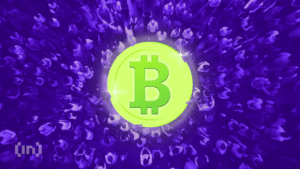The Future of Decentralized Credit?

According to the World Bank, 1.4 billion adults worldwide remain unbanked. The global financial system, despite its unbelievably vast infrastructure, falls far short of serving the world's people fairly in many respects.
For many, the glimmering promise of financial freedom is not just a matter of surviving the rat race, but a story of inflation and documentation.
Bitcoin-Backed Credit: A Global Lifeline for the Unbanked
Millions of people remain underbanked or completely unbanked due to strict credit requirements, high fees and limited access. From undocumented Palestinian refugees, single women in Egypt with no work contracts, or the countless people in Argentina who face hyperinflation of over 120%.
In the year During the financial crisis of 2008, countless individuals in America lost their homes to predatory lending practices, revealing the inherent vulnerabilities of the system. Even today, high inflation erodes savings in fiat currency, leaving consumers with few options to protect their wealth.
Meanwhile, small businesses around the world are being turned away from banks because of strict credit worthiness requirements. One might argue that money is perhaps the most powerful political weapon in the arsenal of power.
This gap in access and equity underscores the importance of alternative financial systems. Bitcoin-backed credit offers a viable solution to both political agendas and economic constraints that keep the poor poor.
What are Bitcoin-backed lending systems?
Bitcoin-backed credit systems allow borrowers to use their BTC holdings as collateral to obtain a loan without selling their assets. These systems work similarly to secured loans, where the borrower pledges the property to get the money.
If the borrower fails to pay, the lender will liquidate the collateral to recover the money. Unlike traditional loans, these systems do not require credit scores or extensive documentation, which makes them more accessible to crypto holders.
“High inflation, currency fluctuations and low trust in central banks may lead to demand for Bitcoin-backed loans. Bitcoin's stability and decentralized nature make it attractive in dynamic economies, and DeFi platforms offer lower barriers and better terms compared to traditional lending,” Open said. Bitcoin Credit Protocol founder Kevin Charles told BeinCrypto in an interview.
The Bitcoin-backed credit market has grown, with several key players leading the way. These platforms allow users to maintain exposure to BTC while accessing fiat or stablecoin liquidity. The simplicity and attractiveness of these systems have fueled their adoption in recent years, which is one of the reasons why they have appeared so peacefully in bear markets.
One of the main benefits of BTC-backed credit is the ability to maintain exposure to Bitcoin price appreciation. Borrowers can unlock liquidity without selling BTC, allowing them to benefit from the long-term benefits that can be sustained.
Additionally, Bitcoin-backed loans serve as a hedge against inflation, providing an alternative to ever-depreciating fiat currencies. For example, a crypto holder in Argentina may not have their national currency devalued and may even earn more.
According to the bank, the USD now has an inflation rate of 2.4%, which is notably the lowest since February 2021. Meanwhile, BTC inflation is only 1.7%.
BTC-backed systems also promote access to funds. Unlike traditional banks that require strict credit checks, Bitcoin-backed credit platforms primarily assess the value of the collateral. This approach opens doors for individuals in regions with limited banking infrastructure, providing a lifeline to the unbanked.
For those who get decentralization right, global inclusion is the real selling point. Bitcoin-backed credit has the potential to provide financial services to these populations, bridging the gap created by traditional systems. Central banks and international financial institutions remain an enigma to the ever-changing demands and changes of the political playing field.
In a country like Lebanon, whose residents mainly trade in dollars due to the ineffective LBP, citizens are prevented from spending their own dollars when the central bank runs out of dollars. For reference, one dollar is equal to 89,550 LBP. In neighboring Egypt, rumors of frozen US dollar accounts also began to circulate before being dismissed by central bank officials.
“Bitcoin-backed credit works on a globally decentralized network, meaning access is not dependent on income, location or credit history. By using Bitcoin as collateral, anyone with an asset can get a loan without a traditional gatekeeper. Early DeFi platforms are increasing adoption in regions with limited banking access.” They show its arrival, highlighting the potential of financial inclusion, added Charles.
Yet, even with all these advantages, twinship is the law of the universe. Bitcoin-backed credit systems are no cure-all solution; They carry significant risks.
The most obvious is Bitcoin's price volatility. A sudden drop in the price of BTC could trigger margin calls, forcing borrowers to increase collateral. In the year During the crypto market crash of 2022, countless borrowers became unsecured due to falling prices. According to Charles, there are ways to reduce volatility.
“Volatility is managed through over-collateralization and automated liquidations. By requiring more collateral than the loan's value, platforms create a buffer against price declines. Additionally, real-time monitoring ensures that loans adjust to market conditions, maintaining stability even during price crashes.”
The Three-Eyed Trojan Horse: Centralism Revisited
Even so, Bitcoin-backed credit systems have socioeconomic implications that warrant investigation. The first is that while these platforms democratize access to credit for crypto holders, they risk creating new financial gateways. Wealthy crypto investors or “crypto whales” will benefit the most, while average users with limited holdings may find themselves excluded.
Whales, or addresses holding more than 100,000 BTC, account for 21% of the total Bitcoin supply. This dynamic means continued concentration of wealth in the crypto space. If this is the case, we can say goodbye to inclusion.

The second threat is traditional financial institutions. Bitcoin-backed credit markets are increasingly entering the market through acquisitions and regulatory influence.
Banks such as Goldman Sachs and JPMorgan have begun exploring crypto-backed lending, suggesting that it can balance decentralized and traditional finance. In November, Bloomberg reported that Goldman Sachs is preparing to launch a new company focused on digital assets. While these developments bring legitimacy, they also raise concerns about co-opting Bitcoin's decentralized ethos.
Then enters the third and final Trojan horse: government regulation. It presents both opportunities and challenges for Bitcoin-backed credit systems.
Regulation can legitimize these platforms while ensuring customer protection and stability. But excessive regulation can stifle innovation and undermine decentralization.
For example, the EU's MCA framework promoted transparency, but called for stricter compliance requirements, which caused disagreements in the crypto industry. Binance, the world's largest crypto exchange by trading volume, had to disable crypto trading services for its European users in June after the MCA was discovered.
Another issue that could affect accessibility is know-your-customer (KYC) standards, which can hamper those relying on crypto wallets for not having enough personal documents. Policymakers argue that platforms without strict KYC controls risk aiding criminals in money laundering activities. In the year By 2023, Turkey has developed new crypto laws aimed at tightening KYC standards.
“We're looking at re-centralizing a system designed to be free. The challenge is to find a balance without diluting the core principles of Bitcoin,” said Charles.
Platforms like Aave and Sovryn feature decentralized approaches to Bitcoin-backed credit. These systems rely on smart contracts to automate transactions, reduce the need for intermediaries and ensure transparency. But decentralization comes with its own set of challenges, including scalability, security vulnerabilities, and regulatory gray areas.
There are still success stories. Borrowers have used Bitcoin-backed loans without selling BTC to finance businesses, pay medical bills, or navigate economic uncertainty. Conversely, others have experienced significant losses due to liquidity during market downturns, highlighting the high stakes of these systems.
In conclusion, Bitcoin-backed credit represents both a financial revolution and a cautionary tale. Its future lies in its ability to scale, remain accessible, and adhere to Bitcoin's decentralized nature.
As traditional finance enters the space and regulatory frameworks evolve, the challenge is to strike a balance between innovation and inclusion. Whether these systems democratize finance or simply replace gatekeeping remains to be seen.
Disclaimer
Following Trust Project guidelines, this feature article presents opinions and perspectives from industry experts or individuals. BeInCrypto is committed to transparent reporting, but the views expressed in this article do not necessarily reflect those of BeInCrypto or its employees. Readers should independently verify information and consult with a professional before making decisions based on this content. Please note that our terms and conditions, privacy policies and disclaimers have been updated.













